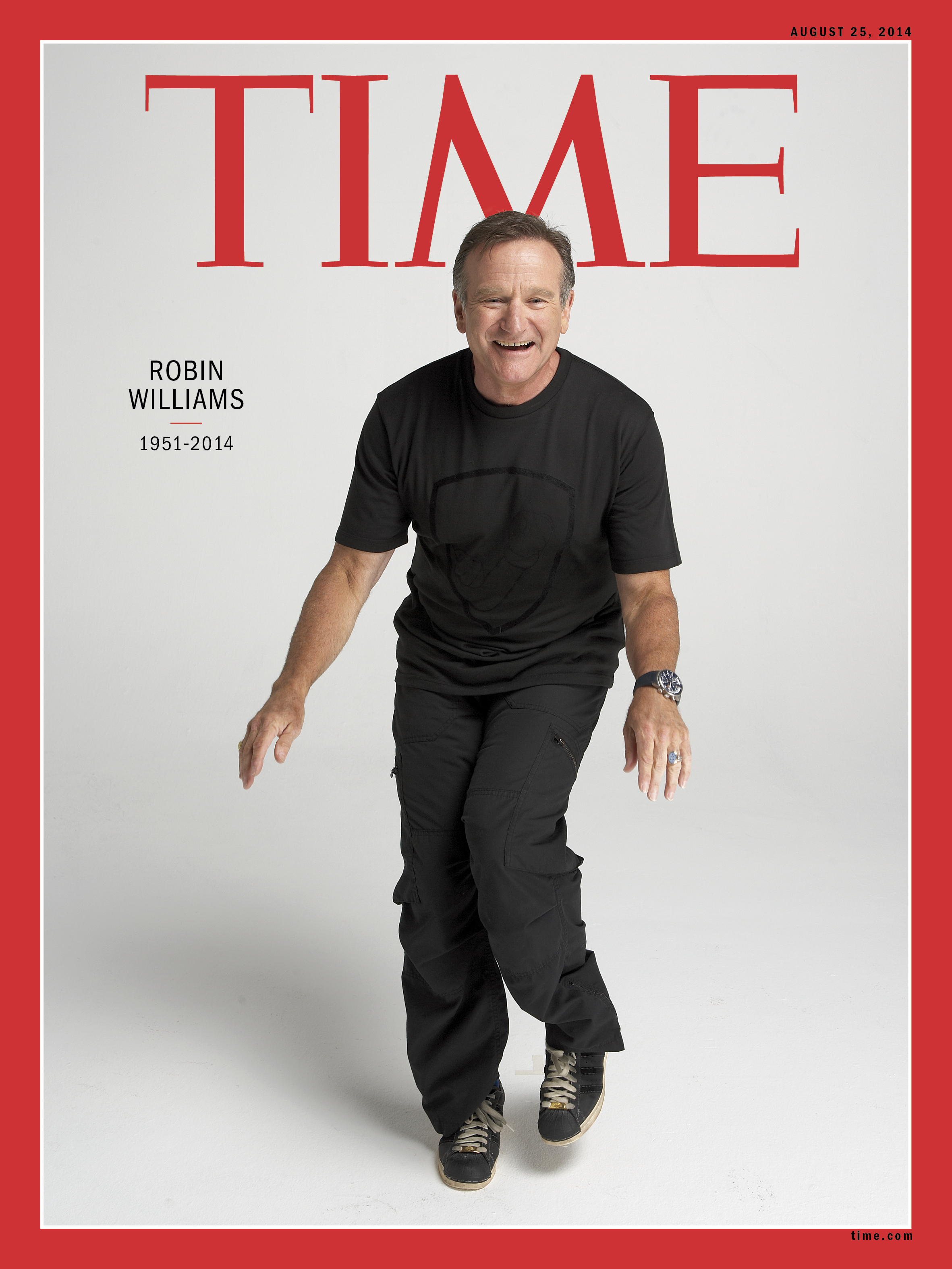
TIME will publish a special commemorative issue on Robin Williams to hit newsstands and tablets on Friday, Aug. 15. The issue includes tributes from Dick Cavett, Alan Alda, Joan Rivers, Patch Adams, Jim Norton, Gilbert Gottfried, Margaret Cho, Lewis Black, Nathan Lane, Bill Maher and more, as well as remembrances from TIME critics Richard Corliss and James Poniewozik.
The cover features a photograph of Williams by Nigel Parry taken in 2007. This is the second time that Williams has appeared on the cover of TIME; he was first on the cover as the character Mork on March 12, 1979.
Corliss writes in Williams’ obituary, “He could play anyone, but not just one: not ‘just’ Robin Williams. All those voices in the head of this comic Hamlet must have told him it was time to be quiet. The rest is silence.”
Dick Cavett: “Robin and I agreed once that it’s galling to hear — when you’re ‘in it’ — the question: ‘What have you got to be depressed about?’ The great British actor and comedian, Stephen Fry, a fellow sufferer, replies ‘And what have you got to have asthma about?'”
Alan Alda: “For years, we had watched with awe as a Niagara of wit poured from his unconscious. Where did that manic waterfall of funny have its source? … Unfortunately, sometimes the mind that runs so fast it can’t keep up with itself also has its downtime. I didn’t know he suffered from depression, although it doesn’t surprise me. But it makes me want to do something. I hope it makes us all want to do something.”
Joan Rivers: “Robin was one of the great interviews. You’d see him coming down that red carpet and you knew, O.K., now we’re gonna have fun. We’re not gonna hear the usual, ‘Yes, we all love each other on the set.’ The one I remember most is, I had this incredible dress, I think it was Dior, with great big gold feathers on the top, absolutely beautiful. I was looking so snappy, I thought. And he came up and did five minutes on looking for eggs in my top, because I looked like a chicken. It was fabulously insane. He made like a chicken, and was clucking, and looking for eggs. Hilarious.”
Patch Adams: “While watching him work on the set of the film based on my life — Patch Adams — I saw that whenever there was a stressful moment, Robin would tap into his improvisation style to lighten the mood of cast and crew. Also, I would like to point out, Robin would be especially kind toward my children when they would visit the set … I’m enormously grateful for his wonderful performance of my early life, which has allowed the Gesundheit Institute to continue and expand our work.”
Jim Norton: “The funniest people I know always seem to be the ones surrounded by darkness. And that’s probably why they’re the funniest. The deeper the pit, the more humor you need to dig yourself out of it … There is simply no way Robin could have understood the way the rest of us saw him. And there is simply no way he could have understood how much respect and adoration other performers had for him. At least I hope he didn’t understand. Because it’s too sad to think that maybe he did understand, and it just wasn’t enough anymore.”
Gilbert Gottfried: “He worshipped Jonathan Winters, and you definitely could see the similarities. One big one is that they were the same on stage and off. Every now and then he would talk seriously, but more often than not, he was that guy. Every now and then, another part of him would pop up that was quiet.”
Margaret Cho: “When I started comedy in San Francisco in the ’80s, Robin would hang around the clubs I started doing shows at and grew up next to … He was the patriarch of our little clan of comedians in San Francisco. All of us looked at him, in a way, as a father figure. That’s why this is so upsetting.”
Nathan Lane: “One day in 1995 while riffing in the character of a snobby French toy-store owner, Robin made me laugh so hard and so long that I cried. It seemed to please him to no end. Yesterday I cried again at the thought that he was gone.”
Lewis Black: “[On the USO tours], the amount of energy he brought when we would get off of a helicopter and walk toward the troops — the amount of energy he gave to them was unbelievable. It was really incredible to be in that kind of giving presence … It’s proof again that the good die young, and pricks live forever. He’s gonna be missed. There’s a hole, and it’s gonna take a long time to be filled.”
See TIME’s ongoing coverage of Robin Williams here.
More Must-Reads from TIME
- Donald Trump Is TIME's 2024 Person of the Year
- Why We Chose Trump as Person of the Year
- Is Intermittent Fasting Good or Bad for You?
- The 100 Must-Read Books of 2024
- The 20 Best Christmas TV Episodes
- Column: If Optimism Feels Ridiculous Now, Try Hope
- The Future of Climate Action Is Trade Policy
- Merle Bombardieri Is Helping People Make the Baby Decision
Contact us at letters@time.com